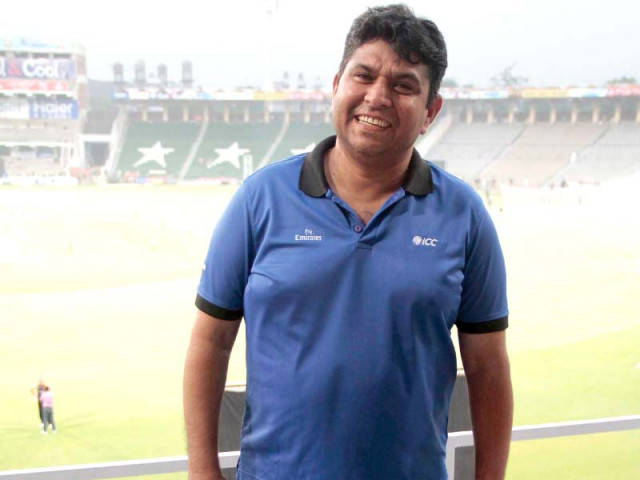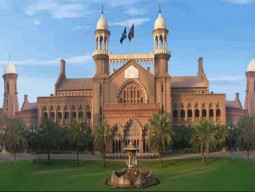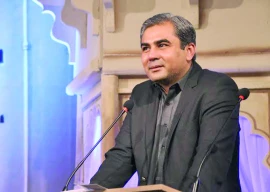
The 2009 armed attack on the Sri Lankan cricket team changed many lives and one of them was umpire Ahsan Raza. Injured severely in the attack, Raza is still making a name for himself in international cricket.
The 40-year-old was hit by two bullets in the incident — one in the stomach and the other on his right lung. He was lucky to survive — unlike his bus driver Zafar Khan, who died with a single bullet which pierced through his heart — but he has been burdened by the injuries.
“I count myself lucky because the bullets that killed Zafar could have decided my fate as well but I am thankfully alive and I’ll always remain grateful to Him for giving me a second life,” Raza told The Express Tribune.
For Raza, the damage was not as emotional as it was physical. “The biggest impact of that incident was not on my mental health but on my physique because that has deteriorated and people criticise it without knowing that I now have a body which doesn’t work with perfection,” said the 41-year-old. “I have only one lung because the bullet that pierced my other lung had the last laugh. I still feel pain in the stitches which hold my stomach together.”
Till now, Raza has officiated 51 international matches in all formats with 25 ODIs (17 as on-field umpire and eight as the TV umpire), three Tests (TV umpire) and 23 T20Is (17 on the field and six in the TV room).
He has also worked as fourth umpire in numerous matches and that ill-fated second Test against Sri Lanka was one of them.
“People don’t realise that when I stand in 100-over ODIs and first-class matches, I have to prepare my body in a different way because it is not normal,” he said. “There are certain bindings and I can’t exercise normally because my stitches could open if I exert extra pressure on them. My routine includes a 5km brisk walk and jogging as well. After six years, I’m in a position where I’ve started sprinting but I can only do that slowly.”
Having played 21 first-class matches as a wicketkeeper batsman for HBL, Lahore, Sargodha and Faisalabad, Ahsan had long been travelling to the UK to play league cricket. At the time of the attack, he and his family had a multiple-visit visa, which provided him a perfect opportunity to escape the problems in the country, but he decided to stay in Pakistan instead of cashing in on the opportunity.
“It was a big opportunity to go and settle in England by seeking asylum and it wouldn’t have been a problem. I have been going there from 1993 to play cricket and my family had a multiple visa but I decided against the advice of many, including my wife, to stay in the country,” said Raza, who was terminated by his department just three months before the incident.
But while Raza’s decision has helped him gain considerable success, he still begrudges the poor treatment he got from the government. “The government supported driver Meher Khalil who drove the Sri Lankan team to safety but the same treatment was not given to us,” he said.
“Cash was announced for us by the late Salman Taseer but I was told that I can’t get that because that was announced in the time of the governor but Khalil was honoured because he was in the media limelight. If it wasn’t for the PCB, the medical treatment would have been a problem but the board supported me throughout.”
The father of three girls initially suffered mental trauma; aerial firing at the weddings would cause him to jump in fear. But that has healed with time and he has moved on.
Inspired by his former club mate and famous international umpire Aleem Dar, Ahsan hopes to break into the elite panel as well after being an ICC panel umpire for six years.
“Dar has certainly inspired me to do something special for Pakistan because he has improved the image of the country and I want to do the same,” he said. “I understand that he has reached unprecedented levels so I want to keep improving myself and would leave it when I feel that I’m not up to the mark.”
Umpiring was never his first calling though. “My initial plan post cricket was to become a coach and I did level I and II coaching courses from Scotland, but it wasn’t meant to be my career and I came into umpiring,” he added. “I’m really proud of what I’ve achieved so far and count myself lucky that I’m the country’s first umpire educator.”
Published in The Express Tribune, May 31st, 2015.
Like Sports on Facebook, follow @ETribuneSports on Twitter to stay informed and join in the conversation.






1726054615-0/OpenAI-(2)1726054615-0-270x192.webp)











COMMENTS
Comments are moderated and generally will be posted if they are on-topic and not abusive.
For more information, please see our Comments FAQ